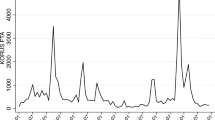Abstract
This paper examines voting by U.S. Representatives onthe North American Free Trade Agreement, the UruguayRound Agreement, and most-favored nation status forChina. Using recent political economy models of tradepolicy to formulate an empirical specification ofcongressional voting behavior, we find evidence thatcampaign contributions influenced legislators' voteson the NAFTA and Uruguay Round bills. Labor groupcontributions were associated with votes against freertrade while business contributions were associatedwith votes in favor of freer trade. Economicconditions in each member's district as well as thebroad policy views of the legislators also affectedrepresentatives' voting decisions.
Similar content being viewed by others
References
Ainsworth, S. and Sened, I. (1993). The role of lobbyists: Entrepreneurs with two audiences. American Journal of Political Science 37: 834–866.
Arnold, R.D. (1990). The logic of congressional action. New Haven: Yale University Press.
Austen-Smith, D. (1991). Rational consumers and irrational voters: A review essay on Black hole tariffs and endogenous policy theory by Stephen Magee, William Brock and Leslie Young, Cambridge University Press, 1989. Economics and Politics 3: 73–92.
Austen-Smith, D. and Wright, J. (1992). Competitive lobbying for a legislator's vote. Social Choice and Welfare 9: 229–257.
Austen-Smith, D. and Wright, J. (1994). Counteractive lobbying. American Journal of Political Science 38: 25–44.
Austen-Smith, D. (1995). Campaign contributions and access. American Political Science Review 89: 566–581.
Bender, B. and Lott, J. (1996). Legislator voting and shirking: A critical review of the literature. Public Choice 87: 67–100.
Box-Steffenmeier, J., Arnold, L. and Zorn, J. (1997). The strategic timing of position taking in Congress: A study of the North American Free Trade Agreement. American Political Science Review 91: 324–338.
Chappell, H. (1982). Campaign contributions and congressional voting: A simultaneous probit-tobit model. Review of Economics and Statistics 64: 77–83.
Congresisional Districts in the 1990's: A portrait of America. (1993). Washington, D.C.: Congressional Quarterly Inc.
Duncan, P. (Ed.) Politics in America: 1994. Congressional Quarterly Press: Washington D.C.
Destler, I.M. (1995). American trade politics. Third Edition. Washington. D.C.: Institute for International Economics.
Grayson, G. (1995). The North American Free Trade Agreement. New York: University Press of America.
Grossman, G. and Helpman, E. (1994). Protection for sale. American Economic Review 84: 833–850.
Hillman, A. (1982). Declining industries and political support protectionism. American Economic Review 72: 1180–1187.
Holian, D., Krebs, T. and Walsh, M. (1997). Constituency opinion, Ross Perot, and roll-call behavior in the U.S. House: The case of the NAFTA. Legislative Studies Quarterly 22: 169–392.
Kahane, L. (1996). Congressional voting patterns on NAFTA: An empirical analysis. American Journal of Economics and Sociology 55: 395–409.
Kau, J. and Rubin, P. (1982). Congressmen, constituents, and contributors: Determinants of roll call voting in the House of Representatives. Boston: Marinus Nijhoff Publishing.
Kaempfer, W. and Marks, S. (1993), The expected effects of trade liberalization: Evidence from US congressional action on fast-track authority. World Economy 16: 725–740.
Kingdon, J. (1973). Congressmen's voting decisions. Ann Arbor: University of Michigan Press.
Magee, S., Brock, W. and Young, L. (1989). Black hole tariffs and endogenous policy theory. Cambridge University Press: Cambridge.
Makinson, L. and Goldstein, J. (1994). Open secrets: The encyclopedia of congressional money and politics. Congressional Quarterly Inc.: Washington D.C.
Morton, R. and Cameron, C. (1992). Elections and the theory of campaign contributions: A survey and critical analysis. Economics and Politics 4: 79–108.
Preeg, E. (1995). Traders in a brave new world. Chicago: University of Chicago Press.
Rodrik, D. (1995). Political economy of trade policy. In: G.M. Grossman and K. Rogoff (Eds.), Handbook of international economics, 1457–1494. Amsterdam: North-Holland.
Schattschneider, E.E. (1935). Politics, pressures and the tariff. Englewood Cliffs, N.J.: Prentice Hall.
Smith, R. (1984). Advocacy, interpretation, and influence in the U.S. Congress. The American Political Science Review 78: 44–63.
Smith, R. (1995). Interest group influence in the U.S. Congress. Legislative Studies Quarterly 20: 89–139.
Steagall, J. and K. Jennings (1996). Unions, PAC contributions, and the NAFTA vote. Journal of Labor Research 17: 515–521.
Stratmann, T. (1991). What do campaign contributions buy? Decipherering causal effects of money and votes. Southern Economic Journal 57: 606–620.
United States International Trade Commission (1992). Economy-wide modeling of the economic implications of a FTA with Mexico and a NAFTA with Canada and Mexico. Washington, D.C.: USITC Publication 2516.
United States International Trade Commission (1993). Potential impact on the U.S. economy and selected industries of the North American Free Trade Agreement. Washington, D.C.: USITC Publication 2596.
United States International Trade Commission (1994). Potential impact on the U.S. economy and industries of the GATT Uruguay Round Agreements. Washington, D.C.: USITC Publication 2790.
Uslaner, E. (1998). Let the chips fall where they may? Executive and constituency influences on congressional voting behavior on NAFTA. Legislative Studies Quarterly 23: 347–371.
Author information
Authors and Affiliations
Rights and permissions
About this article
Cite this article
Baldwin, R.E., Magee, C.S. Is Trade Policy for Sale? Congressional Voting on Recent Trade Bills. Public Choice 105, 79–101 (2000). https://doi.org/10.1023/A:1005121716315
Issue Date:
DOI: https://doi.org/10.1023/A:1005121716315




